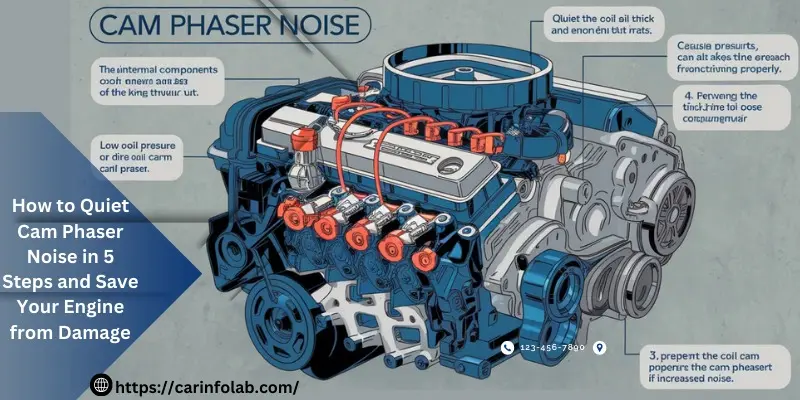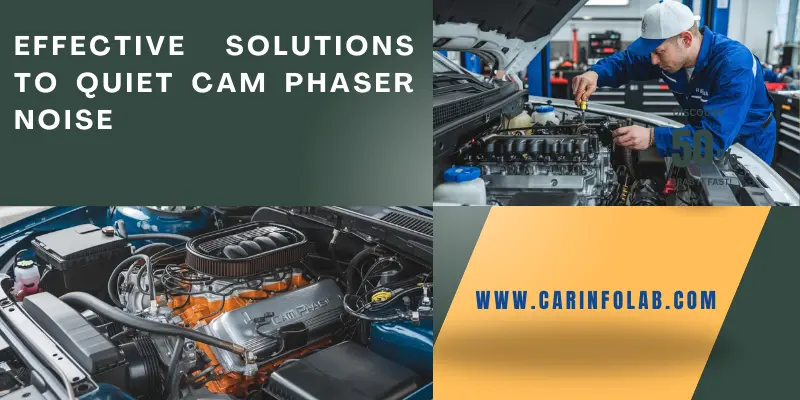How to Quiet Cam Phaser Noise in 5 Steps and Save Your Engine from Damage
Updated: September 5, 2024
125
If you’ve noticed a strange ticking or rattling sound coming from your engine, especially during a cold start, it might be your cam phasers causing the noise. Cam phasers play a critical role in your engine’s variable valve timing (VVT) system, and when they malfunction, the resulting noise can be both annoying and indicative of potential engine issues. How to quiet cam phaser noise is the main question and is essential to prevent further damage and ensure your vehicle runs smoothly.
In this comprehensive guide, we’ll explore everything you need to know about cam phaser noise—from diagnosing the issue to implementing effective solutions. Whether you’re a DIY enthusiast or considering professional help, this guide has you covered.
Understanding Cam Phaser Noise
Cam phasers are components of your engine’s variable valve timing (VVT) system. They adjust the position of the camshaft relative to the crankshaft, optimizing engine performance and efficiency. When cam phasers work correctly, they help your engine deliver power smoothly and efficiently across different RPM ranges.

Why Do Cam Phasers Cause Noise?
Over time, cam phasers can wear out or malfunction, leading to a noticeable ticking or rattling noise. This noise is most prominent during a cold start when the engine oil is still thick and hasn’t fully circulated. Common causes of cam phaser noise include:
- Wear and Tear: Over time, the internal components of the cam phasers can wear out, leading to loose parts that rattle.
- Oil Issues: Low oil pressure or dirty oil can prevent the cam phasers from functioning properly, causing noise.
- Cold Starts: During cold starts, the oil is thick and takes time to reach all engine components, leading to increased noise.
How to Quiet Cam Phaser Noise
Before diving into solutions, it’s crucial to confirm that the noise you’re hearing is indeed coming from the cam phasers.
Symptoms of Cam Phaser Issues
| How To Feel Cam Phaser Nosie |
|---|
|
How to Determine If the Noise Is from Cam Phasers
- Listen Carefully: The noise typically comes from the top of the engine near the timing chain cover.
- Use a Diagnostic Tool: A professional diagnostic tool can read the error codes related to cam phaser issues.
- Consult a Mechanic: If you’re unsure, a professional mechanic can diagnose the issue accurately.
Effective Solutions to Quiet Cam Phaser Noise
Once you’ve identified that the cam phasers are the source of the noise, there are several ways to address the issue.
Preventive Measures For Quiet Cam Phaser Noise
Preventing cam phaser noise is often the best approach. Regular maintenance can keep your engine running smoothly and reduce the risk of cam phaser issues.
| Tips |
|---|
|
DIY Fixes
For those who prefer to tackle the issue themselves, here are some DIY solutions to reduce or eliminate cam phaser noise.
1. Use Oil Additives
Oil additives can improve oil viscosity and lubrication, reducing noise.
- How to Apply: Add the recommended amount of oil additive to your engine oil during an oil change.
- Product Recommendation: Look for additives specifically designed to reduce engine noise, such as Lucas Oil Stabilizer or Marvel Mystery Oil.
2. Tighten Loose Components
Over time, components around the cam phasers can become loose and contribute to noise.
- How to Do It: Carefully inspect and tighten any loose bolts or components near the timing chain cover.
- Tools Needed: A basic set of wrenches and a torque wrench.
3. Adjust the Timing Chain Tensioner
The timing chain tensioner helps maintain the correct tension on the timing chain, which can affect cam phaser operation.
- How to Adjust: Ensure the engine is cool before starting to avoid burns or other injuries.
- Loosen the Tensioner Lock Nut: Be careful not to fully remove the nut; just loosen it enough to adjust the tensioner.
- Adjust the Tensioner: Turn the tensioner bolt to adjust the tension. Clockwise usually increases tension, while counterclockwise decreases it.
Professional Repair Options
If DIY fixes don’t resolve the noise or if you prefer not to tackle the issue yourself, professional repair is the next step. Cam phaser noise is a common problem in Chevy 6.6 gas engines, and it can be caused by a variety of factors.
When to Consider Replacing the Cam Phasers
- Persistent Noise: If the noise persists despite your efforts, the cam phasers may be worn out and require replacement.
- Engine Performance Issues: If you notice a significant drop in engine performance, it’s time to consult a mechanic. Sometimes Noise originates from any parts of the suspensions of the car as well.
Cost Estimates for Professional Repair
- Cam Phaser Replacement: Replacing the cam phasers can cost anywhere from $800 to $2,500, depending on your vehicle’s make and model.
- Timing Chain Replacement: In some cases, the timing chain and tensioner may also need replacement, adding to the cost.
Special Considerations for Cold Starts
Cold starts are a common trigger for cam phaser noise. Here’s how you can reduce the noise during cold weather:
| Extra Tips For Cold Starts |
|---|
|

Product Recommendations To Reduce Cam Phaser Noise
| Product | Benefits |
|---|---|
| Lucas Oil Stabilizer | Improves oil viscosity, reduces engine wear, quiets engine noise |
| Marvel Mystery Oil | Cleans and lubricates engine components reduces noise, improves performance |
| Royal Purple Synthetic Oil | High-performance synthetic oil, reduces friction and noise, especially during cold starts |
“If you’re attempting a DIY fix, always consult your vehicle’s service manual. It’s your best guide for understanding your specific engine configuration.”Jane Doe, Automotive DIY Blogger
Conclusion
Cam phaser noise can be an annoying and potentially harmful issue if left unaddressed. By following the steps outlined in this guide, whether through preventive maintenance, DIY fixes, or professional repair, you can reduce or eliminate the noise, ensuring your engine runs smoothly and efficiently.
If you’re experiencing cam phaser noise in your Chevy 6.6 gas engine, it’s important to address the issue promptly to avoid further damage and costly repairs. Taking action now can prevent more severe problems in the future, saving you time and money. So, grab your tools, check your oil, and say goodbye to that annoying cam phaser noise for good!
FAQs
What causes cam phaser noise?
Cam phaser noise is typically caused by wear and tear, low oil pressure, or issues during cold starts. It’s most often heard as a ticking or rattling sound from the engine.
Can I drive with cam phaser noise?
While you can drive with cam phaser noise, it’s not recommended. The noise indicates a problem that could lead to more serious engine damage if left unaddressed.
How much does it cost to replace cam phasers?
The cost to replace cam phasers ranges from $800 to $2,500, depending on the vehicle’s make and model.
Do oil additives really help with cam phaser noise?
Yes, oil additives can improve oil viscosity and lubrication, which may help reduce cam phaser noise, especially in older engines.
Is cam phaser noise more common in certain vehicles?
Cam phaser noise is more common in vehicles with variable valve timing systems, particularly in Ford trucks like the F-150 with higher mileage.
Please Write Your Comments